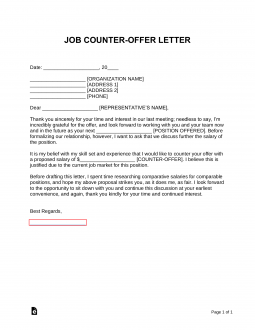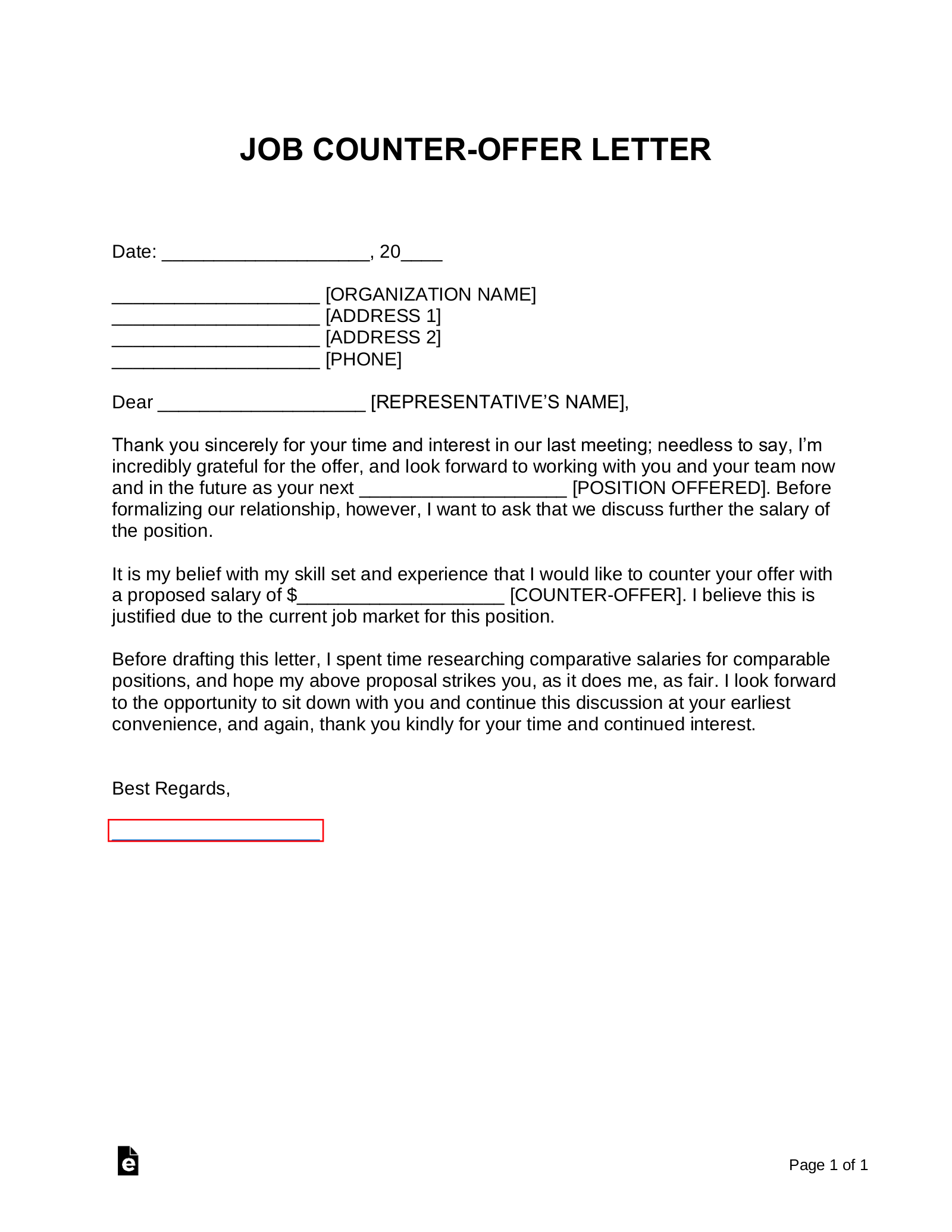Updated August 22, 2023
A job offer counter-offer letter is a response to an employer who is extending a job offer. The letter conveys its writer’s desire to negotiate for higher pay.
Table of Contents |
Evaluating a Job Offer
The first question to ask, before drafting a counter-offer letter, is whether the job offer is a good one. The answer to this will vary depending on a range of factors, including a prospective employee’s experience, expectations, and goals.
One important factor to consider is the base salary being offered. Research what other people in the same field, performing the same daily activities at work, are being paid. Does the base salary seem acceptable, given the going rate?
It can be helpful to draft a weekly, monthly, or yearly budget, mapping out basic and extenuating expenses such as rent, car insurance, car payments, utility bills, phone and internet, and student loan payments. How much will this job cost in terms of travel, required equipment, or a potential location change? Will the base salary being offered cover expenses and contribute to a savings account, too?
Think also about the benefits in the offer letter, including paid vacation time, health insurance, stock benefits, insurance, retirement and pension contributions, as well as any other perks.
Consider whether the job offer contains the potential for growth and upskilling. If it doesn’t, perhaps it makes sense to negotiate for higher pay upfront.
Benefits of Negotiating a Salary
The obvious benefit of negotiating a salary is an employer might agree, after considering a well-reasoned counter-offer, to pay more. And while there are limits to the extent to which wages can impact job satisfaction, the proven reality is that higher pay tends to make workers happier in their jobs. A study published in the Journal of Economic Behavior found that even an expectation of a wage increase would positively affect an employee’s job satisfaction.
Most people spend most of their waking hours working, so being satisfied with a job, as well as with the compensation being received in exchange for doing that job, can considerably impact their overall quality of life.
Not only can negotiating an offer lead to a literal payoff, but it can also make a prospect appear more professional, confident, and assertive to an employer.
Tips for Negotiating a Job Offer
Be patient. A common mistake prospective employees make is to rush into accepting a job offer. A good rule of thumb is to wait two days before sending a counter-offer letter.
Operate and communicate as if other offers are already on the table. Don’t appear desperate. Be confident, or fake it. While negotiating a salary or offer can feel like a stressful or nerve-wracking process, remember that it’s in the employer’s best interest to keep employees happy. Happier employees tend to be more productive, more engaged in furthering a company’s mission, and more likely to remain in their jobs.
It’s also worth noting, however, that a counter-offer should remain within realistic parameters. Asking a small start-up with a thin budget to pay more than a large corporation might, for example, may not be realistic. This is why it’s important to do some research into the company, as well as the industry to which it belongs, before sending a counter-offer letter.
How to Negotiate (5 Steps)
- Ask Questions
- How Much ($) to Ask for
- Send a Counter-Offer
- Meet and Negotiate
- Sign a Formal Agreement
1. Ask Questions

Whether or not a candidate feels it’s necessary to negotiate a salary, it’s important to ask some questions before accepting a job offer. Here are some questions to consider.
- How big is the company? What were its profits last year?
With larger companies, there may not be as much room to negotiate as the pay scale may be fixed. However, it’s also true that a larger company may have more capital and therefore purchasing power. Knowing how many people a company employs, as well as its financial profile, can be helpful information to possess before negotiating a salary offer.
- How much did the company grow from the year before?
The employer may not be able to answer this question before an employee signs a non-disclosure agreement. However, it’s worth asking for the same reason it’s worth asking about the size of a company’s staff and operating balance: in order to define the parameters of a reasonable counter-offer.
- What will the role entail?
What’s the workload? What daily activities does the role involve? Will they require long workdays? Knowing what kinds of hours and frustrations a job will entail can help a candidate determine whether or not to ask for increased pay, and how much seems fair.
3. Send a Counter-Offer

While a counter-offer can be lodged over the phone, it’s always best to communicate in writing. Craft an email that begins by thanking the employer for the offer and expressing enthusiasm about joining the team. Outline the specific salary and benefits desired. Express a willingness to meet in person should the employer prefer to discuss the request.
5. Sign a Formal Agreement

Once the parties have agreed to the specifics of an offer, the next step is to fine-tune an employment agreement.
Sample #1
[COMPANY NAME]
[STREET ADDRESS]
[ZIP CODE]Dear [FULL NAME],
Thank you, sincerely, for your time and interest. I’m incredibly grateful for the offer, and look forward to working with you and your team as your next [POSITION OFFERED].
Before formalizing our relationship, I want to ask that we discuss further the salary of the position. I believe that with my skill set and experience I am eligible for a salary of [COUNTER-OFFER]. My proposal is based on my research into the current job market.
I look forward to the opportunity to sit down with you and continue this discussion at your earliest convenience. Thank you for your time.
Sincerely,
_________________________
Sample #2
[COMPANY NAME]
[STREET ADDRESS]
[ZIP CODE]Dear [FULL NAME],
It’s a great honor to receive an offer for the position of [POSITION] with [COMPANY NAME]. I am eagerly anticipating becoming part of your team. I look forward to joining you in furthering the mission of your company.
After reviewing the salaries attached to this position at other companies and considering my experience, training, and skill set, I believe it makes sense for me to request that we further discuss the proposed salary. Based on going rates, $[PROPOSAL] seems to me like a fairer figure.
If you prefer to discuss this proposal over the phone or in person, please let me know and we can arrange a time that suits your schedule. I’m grateful for your time.
Sincerely,
________________________




